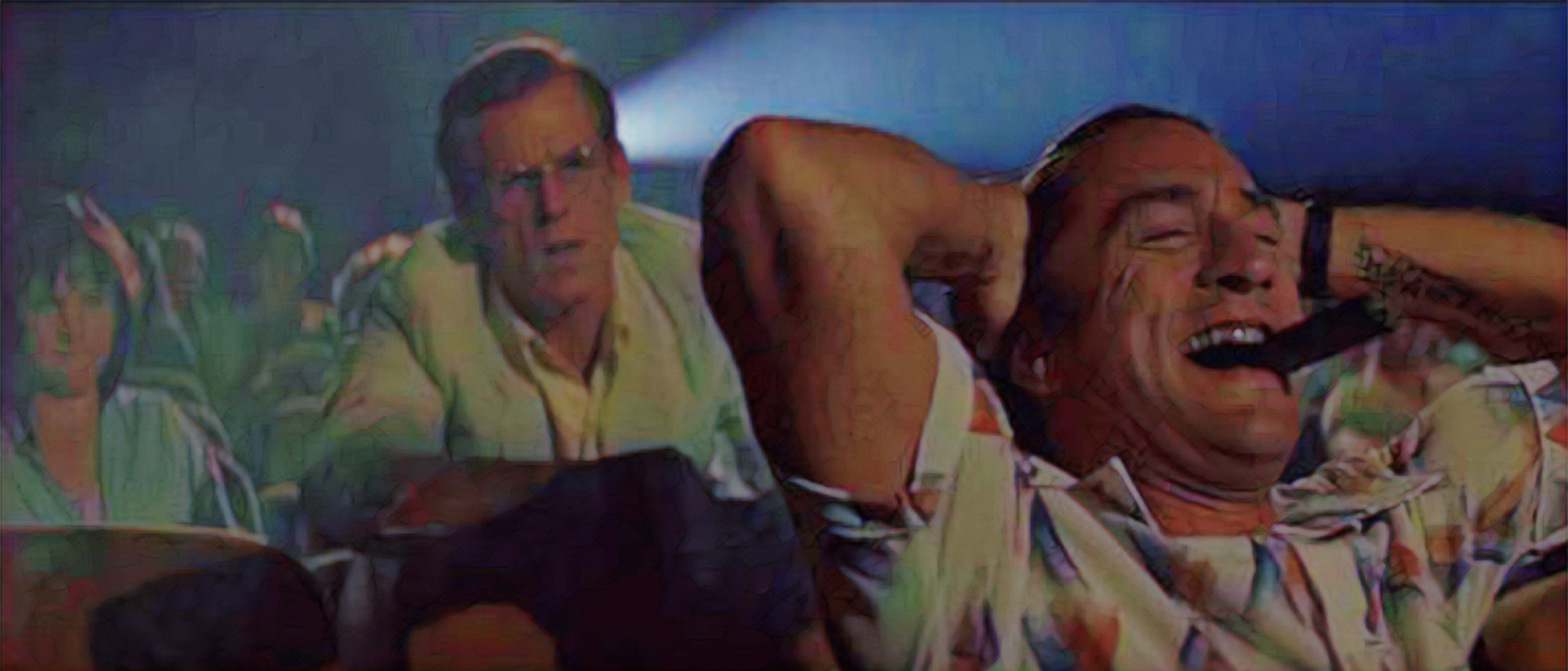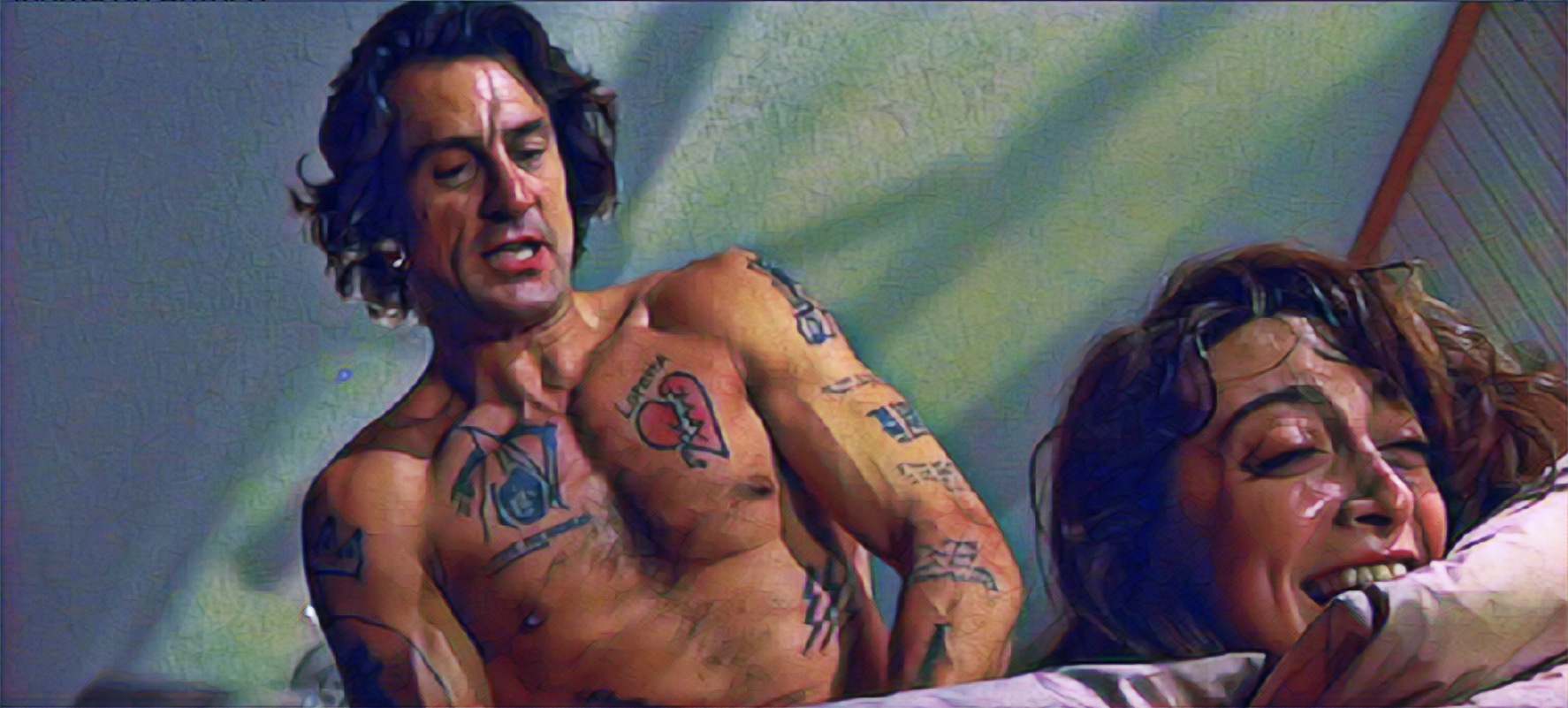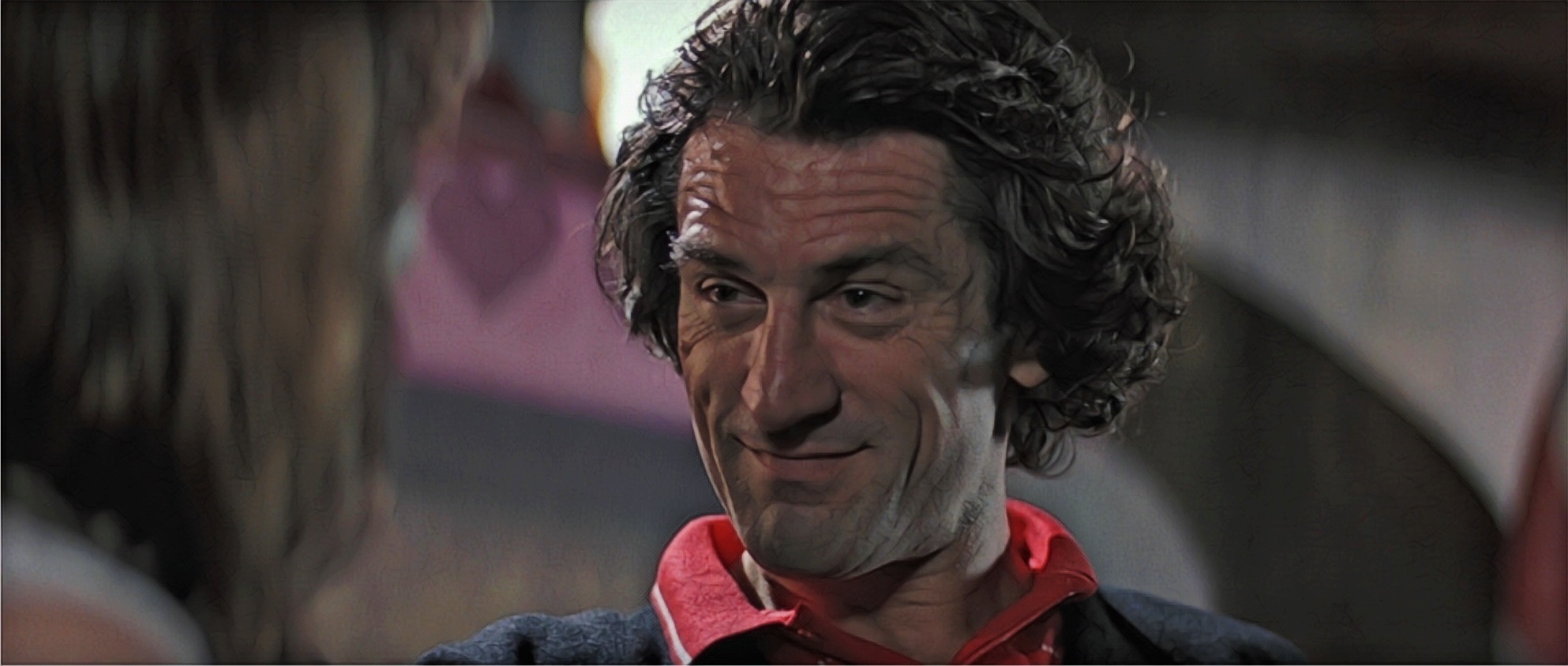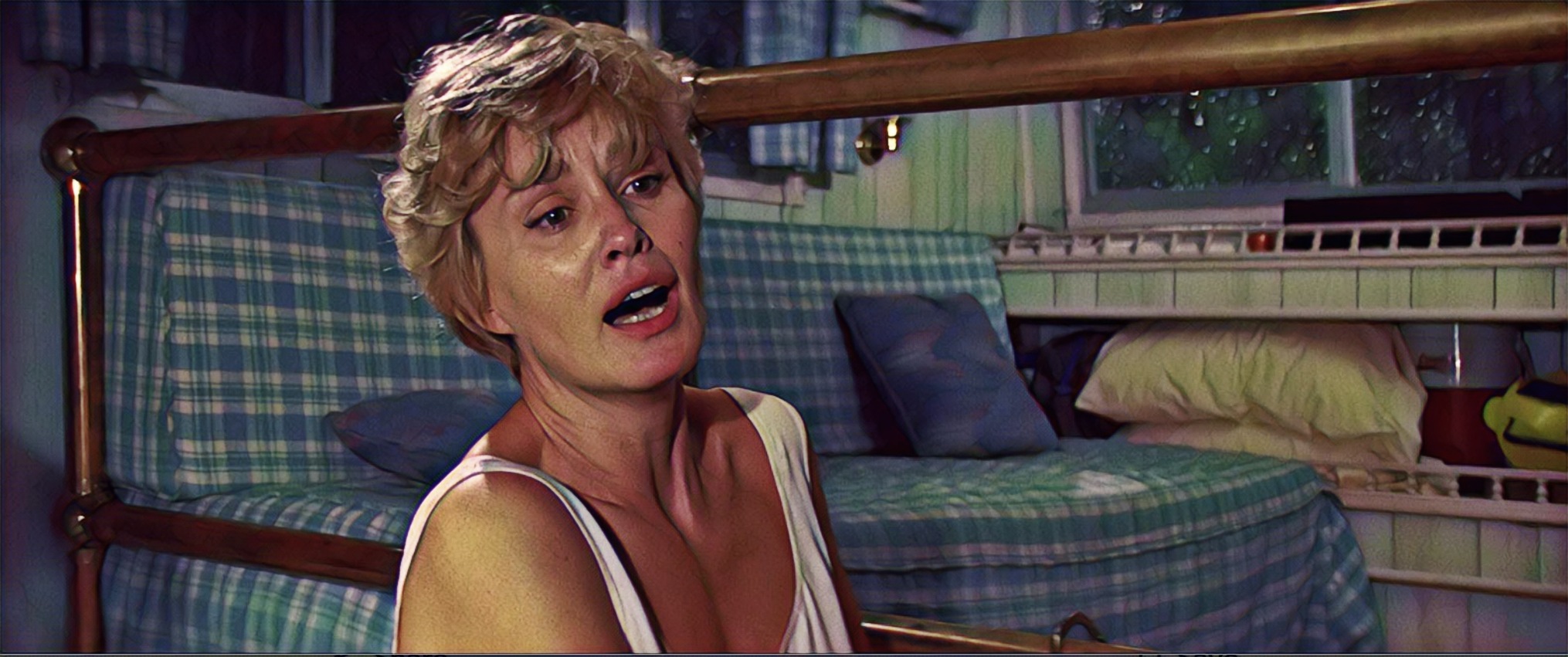← Back to Reviews
in

The only true re-make Scorsese has done to date is Cape Fear, from a pulp novel called The Executioners by John D. MacDonald, previously adapted to film in 1962 by British-born director J. Lee Thompson (The Guns of Navarone), starring Gregory Peck, Robert Mitchum, Polly Bergen, Martin Balsam and Telly Savalas. Scorsese was a big fan of the movie, one of the latter Noir classics, so he knew there was no need to re-make it in the same tone and style. His own spin on the material is quite different, though while keeping the same main plot points and conflicts, he paints a more complex morality tale for a more complex time.

The movie is about vengeance, and the inability to outrun past mistakes. Nick Nolte, who previously worked with Scorsese on the short film "Life Lessons" (one segment of the anthology New York Stories), stars as Sam Bowden, a Southern defense attorney who has just moved to a new small town with his wife, played by Jessica Lange, and teenage daughter, played by Juliette Lewis. On the surface everything is perfect, but we quickly learn that Sam is on the flirtatious verge of an adulterous affair with a co-worker (Illeana Douglas), and there is much underlying tension in the marriage because of past infidelities - part of the reason for the move and "new" start. Also, their daughter Danielle, rebellious and just coming into her sexuality though unsure of what it is, was caught with some pot at school and must take a summer school course. Despite the huge house and good job in an idyllic town, the Bowden family is far from perfect. Then enters The Devil, who comes in the form of Max Cady (DeNiro), a hard-as-nails ex-con who has just been released after a long sentence. He's come looking for Sam Bowden, his former attorney, who he blames for his incarceration - for the rape and brutal beating of a young woman. Soon Cady will be wreaking true terror on all three members of the Bowden family, at first with intimidation, building surely to life-threatening peril.

While the basics of ex-con Cady terrorizing the Bowdens are the same, this modernized version is really much, much different than the '62 flick. In the original, Mr. and Mrs. Bowden (Peck and Bergen) had a strong marriage, and their daughter was a good and happy child. Cady (Mitchum) came at them relentlessly, but his anger was really irrational and insane. In the Scorsese version, the Bowdens have all kinds of issues and faults, and Cady's rage - while certainly insane, is justified on some basic level, because we learn that Sam had actually blown the case intentionally, having essentially passed judgement on the horrible crime of his client. Peck's attorney had done his job to the letter, but Mitchum still blamed him anyway. Nolte's lawyer buried evidence that could have either gotten DeNiro's monster off completely or at least severely decreased his sentence. That decision, while understandable on a human level because Cady's crime was so viscious, is of course completely and totally wrong in regards to the ethics of the law and our system of justice. All of these changes make the story more complicated, and for me much more engaging and real (even if the tone often approaches the surreal). The Demon trying to destroy them is one of Sam's own creation, and the weaknesses Cady uses to get at them are further extensions of their own faults and failures, not just a random Hell coming to attack a perfect family.

The visuals, as well as the tone, are very stylized. Scorsese and cinematographer Freddie Francis (The Elephant Man, Glory, The Straight Story) really have fun with the look of the film, and this was Scorsese's first use of a true 2.35:1 widescreen process. It is something he had avoided over his career specifically because he hated seeing scope films butchered with panning and scanning for TV and video distribution, but with the advent of LaserDiscs he knew the proper aspect ratio could now be maintained. He uses every inch of the wide frame - some amazing compositions. The musical score by Elmer Berstein is for the most part a re-arrangement of the original score from Thompson's film, a wonderful theme by the immortal Bernard Herrmann (Citizen Kane, Verigo, Psycho), who's last score was for Marty's Taxi Driver (completed quite literally in the last days of his life). It was a perfect idea, that Scorsese credits to a suggestion from DeNiro. It is a powerful and thunderous piece of music, and perfectly matches the style of the movie - part loving hommage, part winking exaggeration.
Scorsese also has loads of fun with the thriller genre conventions. For me this is his Touch of Evil. Just as Welles was able to add his artistry and perspective to a pulpy Noir tale, so does Scorsese here with material that, even with the added psychological deminsions and character flaws, is still at the roots very much a genre piece and adheres to (while still playing with and commenting upon) those rules and cliches.

Nolte is very good and controlled as Sam, and Lange is his equal as the very tough but almost at her breaking point Leigh. Juliette Lewis was an amazing find (her biggest role to that time was as Audrey in Christmas Vacation), and she was rightly Oscar nominated for her pitch perfect work as the curious teen who's budding sexuality leads straight to Hell and terror. The creepy nature of her relationship with Cady is another ingredient absent from the original, as you'd expect. And of course, yet again, DeNiro (also Oscar nominated) goes through another physical and karmic transformation to become the super-muscular, overly-tattooed monster with a thick Southern drawl and a head full of vengeance and Bible quotations. His performance is pitched at the same stylized level as the visuals and tone, and while certainly over-the-top, it is an intentional camp that still manages to be credibly horrifying and believable while also cartoonish and broad, a real multi-dimensional character and a parody at the same time.
The supporting cast includes Joe Don Baker (Charley Varrick, Walking Tall) as a private investigator Sam hires to help steer Cady clear of his family, good ol' Fred Dalton Thompson (The Hunt for Red October, Die Hard 2) as Bowden's boss, and in three wonderful cameos as a cop, a lawyer and a judge respectively, Bob Mitchum, Gregory Peck and Martin Balsam - the stars of the '62 film.

"Maybe I'm the Big Bad Wolf?"
Because some of the thriller conventions are so silly out of context, and because the entire movie is stylized so over-the-top, building to a fantastic if unlikely crescendo of a finale, Cape Fear is probably easily dismissed by many as nothing more than a slick and ridiculous thriller, which on one level it is. But there is much more to the movie than those simple surface elements, and it makes for one of Scorsese's most fun and accessible works (though definitely adult and grisly).

An interesting trvia note: Cape Fear was originally supposed to be made by Steven Spielberg, and Schindler's List by Scorsese. They essentially traded projects, when Marty thought a Jewish director might bring something he couldn't to the material. The Cape Fear screenwriter, Wesley Strick (Arachnophobia, Wolf), had adapted the original with Spielberg in mind, and as you'd imagine the movie was far less dark and not as morally murky. When he learned Scorsese was helming the project, he gleefully excised the perfect family for the troubled group and demonic terror. Scorsese was rewarded with the most commercially successful movie of his career, and Spielberg with dozens of awards. But, oh, to imagine Schindler in the hands of Martin Scorsese...!

Cape Fear was released as a special edition R1 DVD in 2001 (as was the 1962 original version), including deleted scenes and an excellent retrospective documentary. No commentary track though (again, too busy with Gangs of New York).
The only true re-make Scorsese has done to date is Cape Fear, from a pulp novel called The Executioners by John D. MacDonald, previously adapted to film in 1962 by British-born director J. Lee Thompson (The Guns of Navarone), starring Gregory Peck, Robert Mitchum, Polly Bergen, Martin Balsam and Telly Savalas. Scorsese was a big fan of the movie, one of the latter Noir classics, so he knew there was no need to re-make it in the same tone and style. His own spin on the material is quite different, though while keeping the same main plot points and conflicts, he paints a more complex morality tale for a more complex time.
The movie is about vengeance, and the inability to outrun past mistakes. Nick Nolte, who previously worked with Scorsese on the short film "Life Lessons" (one segment of the anthology New York Stories), stars as Sam Bowden, a Southern defense attorney who has just moved to a new small town with his wife, played by Jessica Lange, and teenage daughter, played by Juliette Lewis. On the surface everything is perfect, but we quickly learn that Sam is on the flirtatious verge of an adulterous affair with a co-worker (Illeana Douglas), and there is much underlying tension in the marriage because of past infidelities - part of the reason for the move and "new" start. Also, their daughter Danielle, rebellious and just coming into her sexuality though unsure of what it is, was caught with some pot at school and must take a summer school course. Despite the huge house and good job in an idyllic town, the Bowden family is far from perfect. Then enters The Devil, who comes in the form of Max Cady (DeNiro), a hard-as-nails ex-con who has just been released after a long sentence. He's come looking for Sam Bowden, his former attorney, who he blames for his incarceration - for the rape and brutal beating of a young woman. Soon Cady will be wreaking true terror on all three members of the Bowden family, at first with intimidation, building surely to life-threatening peril.
While the basics of ex-con Cady terrorizing the Bowdens are the same, this modernized version is really much, much different than the '62 flick. In the original, Mr. and Mrs. Bowden (Peck and Bergen) had a strong marriage, and their daughter was a good and happy child. Cady (Mitchum) came at them relentlessly, but his anger was really irrational and insane. In the Scorsese version, the Bowdens have all kinds of issues and faults, and Cady's rage - while certainly insane, is justified on some basic level, because we learn that Sam had actually blown the case intentionally, having essentially passed judgement on the horrible crime of his client. Peck's attorney had done his job to the letter, but Mitchum still blamed him anyway. Nolte's lawyer buried evidence that could have either gotten DeNiro's monster off completely or at least severely decreased his sentence. That decision, while understandable on a human level because Cady's crime was so viscious, is of course completely and totally wrong in regards to the ethics of the law and our system of justice. All of these changes make the story more complicated, and for me much more engaging and real (even if the tone often approaches the surreal). The Demon trying to destroy them is one of Sam's own creation, and the weaknesses Cady uses to get at them are further extensions of their own faults and failures, not just a random Hell coming to attack a perfect family.
The visuals, as well as the tone, are very stylized. Scorsese and cinematographer Freddie Francis (The Elephant Man, Glory, The Straight Story) really have fun with the look of the film, and this was Scorsese's first use of a true 2.35:1 widescreen process. It is something he had avoided over his career specifically because he hated seeing scope films butchered with panning and scanning for TV and video distribution, but with the advent of LaserDiscs he knew the proper aspect ratio could now be maintained. He uses every inch of the wide frame - some amazing compositions. The musical score by Elmer Berstein is for the most part a re-arrangement of the original score from Thompson's film, a wonderful theme by the immortal Bernard Herrmann (Citizen Kane, Verigo, Psycho), who's last score was for Marty's Taxi Driver (completed quite literally in the last days of his life). It was a perfect idea, that Scorsese credits to a suggestion from DeNiro. It is a powerful and thunderous piece of music, and perfectly matches the style of the movie - part loving hommage, part winking exaggeration.
Scorsese also has loads of fun with the thriller genre conventions. For me this is his Touch of Evil. Just as Welles was able to add his artistry and perspective to a pulpy Noir tale, so does Scorsese here with material that, even with the added psychological deminsions and character flaws, is still at the roots very much a genre piece and adheres to (while still playing with and commenting upon) those rules and cliches.
Nolte is very good and controlled as Sam, and Lange is his equal as the very tough but almost at her breaking point Leigh. Juliette Lewis was an amazing find (her biggest role to that time was as Audrey in Christmas Vacation), and she was rightly Oscar nominated for her pitch perfect work as the curious teen who's budding sexuality leads straight to Hell and terror. The creepy nature of her relationship with Cady is another ingredient absent from the original, as you'd expect. And of course, yet again, DeNiro (also Oscar nominated) goes through another physical and karmic transformation to become the super-muscular, overly-tattooed monster with a thick Southern drawl and a head full of vengeance and Bible quotations. His performance is pitched at the same stylized level as the visuals and tone, and while certainly over-the-top, it is an intentional camp that still manages to be credibly horrifying and believable while also cartoonish and broad, a real multi-dimensional character and a parody at the same time.
The supporting cast includes Joe Don Baker (Charley Varrick, Walking Tall) as a private investigator Sam hires to help steer Cady clear of his family, good ol' Fred Dalton Thompson (The Hunt for Red October, Die Hard 2) as Bowden's boss, and in three wonderful cameos as a cop, a lawyer and a judge respectively, Bob Mitchum, Gregory Peck and Martin Balsam - the stars of the '62 film.
"Maybe I'm the Big Bad Wolf?"
Because some of the thriller conventions are so silly out of context, and because the entire movie is stylized so over-the-top, building to a fantastic if unlikely crescendo of a finale, Cape Fear is probably easily dismissed by many as nothing more than a slick and ridiculous thriller, which on one level it is. But there is much more to the movie than those simple surface elements, and it makes for one of Scorsese's most fun and accessible works (though definitely adult and grisly).
An interesting trvia note: Cape Fear was originally supposed to be made by Steven Spielberg, and Schindler's List by Scorsese. They essentially traded projects, when Marty thought a Jewish director might bring something he couldn't to the material. The Cape Fear screenwriter, Wesley Strick (Arachnophobia, Wolf), had adapted the original with Spielberg in mind, and as you'd imagine the movie was far less dark and not as morally murky. When he learned Scorsese was helming the project, he gleefully excised the perfect family for the troubled group and demonic terror. Scorsese was rewarded with the most commercially successful movie of his career, and Spielberg with dozens of awards. But, oh, to imagine Schindler in the hands of Martin Scorsese...!
Cape Fear was released as a special edition R1 DVD in 2001 (as was the 1962 original version), including deleted scenes and an excellent retrospective documentary. No commentary track though (again, too busy with Gangs of New York).
